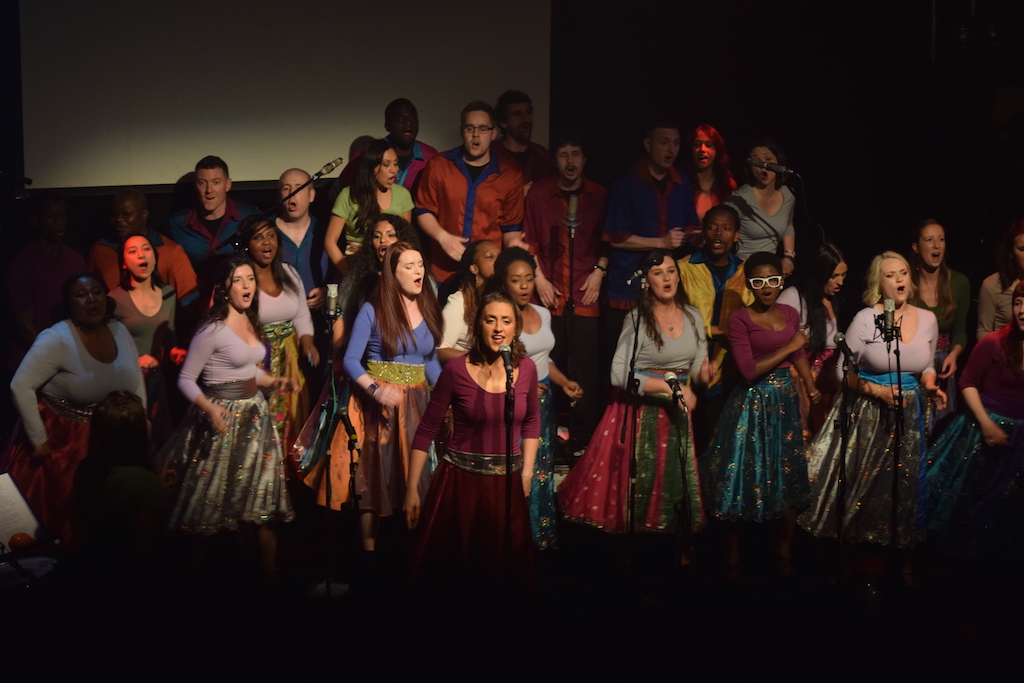Which leads me to my first Dublin travel tip:
If you don’t know where you’re going in Dublin, don’t expect a map to help you. I had more than one with me, but in attempting to find the Button Factory, a venue whose address merely read “Curved Street, Dublin,” my three tiny maps were of no help. Dublin is a convoluted, deceivingly small city in which there is no numbering system, everything is 10 minutes walk from everything else, and the roads change names at a moment’s notice.
I suppose after Friday’s circumnavigation of the entire city on foot I shouldn’t have as many problems from here on out, and fortunately, people are friendly, give you directions when you ask for them, and don’t scoff when you pop out a map at every.single.intersection.
I got lost in Dublin, and then was found.
The reason for this outing to the Button Factory was to see the Discovery Gospel Choir (DGC).
I was invited to DGC’s performance by Aisling McCormick, a Jill of All Trades who is a singer, dancer, composer, and the musical director and conductor of Juneteenth, a special performance commemorating the 150th anniversary of the freeing of the last slaves from Galveston, TX. The performance took us on a journey throughout the evening with songs and text spanning the globe from Europe to West Africa to the Caribbean, and finally into the deep South of the United States. Compelling slides projected behind the performers – too fast to fully read, and certainly to fully comprehend their significance. The performance was a celebration of the end of slavery in the United States, and yet, makes the point that slavery – in some ways – isn’t over.
I came in only a moment late (see above…) to a packed house, yet a somber mood overcame the crowd as the performers took a moment of silence for two tragedies that occurred in the past week: the death of five University College Dublin (UCD) students at Berkeley — UCD is hosting our study abroad program — and a horrific shooting at a church in South Carolina.
Discovery Gospel Choir’s mission is to “challeng[e] its audiences to discover beauty in everyone and to work towards an integrated society.” The group exemplifies diversity by every definition of the word with representatives from nearly every age, race, and culture working together harmoniously (literally). The group desires more than art for art’s sake, and infuses its work with initiatives promoting “a rich ethos of social justice, a deep Christian faith and an ability to entertain people from every walk of life with popular and accessible music.”
Not knowing anything about what I was about to see, it was surprising to me that an Irish gospel group in the middle of Dublin would choose the American slave trade as a theme for a performance. It was even more surprising when Jen O’Malley Dillon came onstage to speak on behalf of the U.S. Ambassador to Ireland at the end.
“This is a unique show,” said Kieran Frost, who conceived this performance. Indeed, I felt as though this evening was an authentic experience that I never expected to have while in Dublin. I came to Ireland with the expectation that I would not feel, see, or experience diversity to the degree that we do in the U.S.; boy was I wrong. I felt as though this was the heart of the community, gathering to share a common experience that transcends race, gender, class, etc. through music, to remind us that, even 6,000 miles away from my home, it’s a small world after all.
The Irish Slave Trade
It wasn’t until our group took a walking tour the next day that I gained a little clarity as to why an Irish arts organization would even care about gospel music, or Juneteenth, or the slave trade in America. Our guide, Garvan, informed us that Irish people were captured and sent to North America by the British as indentured servants and that the life of an Irish servant was made extremely hard, in part because of the torrid history between the Catholic Irish and the Anglican church. Though the accuracy of various narratives about an Irish slave trade are up for debate, I hadn’t heard anything about it until seeing Juneteenth.
I thought you were doing a sport psychology program. What does this have to do with sports psychology?
Nothing, but that’s not really the point.
I am here to study sports, sure, and psychology too. But I am also here to see and feel what it means to be Irish, and, moreover, human.
